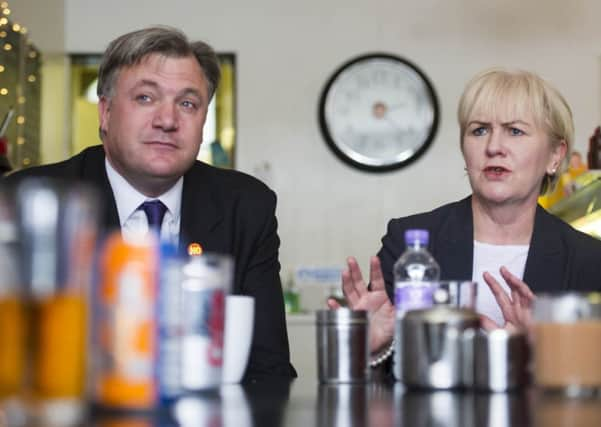Ed Balls: Border controls in Scotland ‘inevitable’


On a visit to Edinburgh, Mr Balls argued that border checks would be required as he also claimed that independence would make Scots worse off.
The Labour MP argued that independence would lead to higher interest rates, Scotland losing the pound, higher food prices and the break-up of UK-wide pension pots.
Advertisement
Hide AdAdvertisement
Hide AdChatting with voters in a cafe on Edinburgh’s Leith Walk, Mr Balls said that First Minister Alex Salmond’s determination to have a different immigration policy in Scotland than south of the Border would make border posts necessary.
Recently, Mr Salmond set a target for net migration, the difference between the number of people moving into and leaving Scotland, of 24,000 per year, in the event of a Yes vote. That figure compared with an average annual net migration, including people moving to Scotland from the rest of the UK, of 22,000 between 2001 and 2011.
The First Minister has said the immigration increase would be achieved by allowing overseas students to stay and work and targeting skilled foreigners and ex-pats who want to come home to Scotland.
Questioned on immigration post independence, Mr Balls said: “If Mr Salmond makes a virtue of changing immigration policy, I think at the moment the view taken in the rest of the United Kingdom is that if a different country chooses to go down that road, then there would have to be checks on mobility across the Border. I think that’s inevitable.”
Mr Balls stopped off at Cafe No 9 on Croall Place, Leith Walk, to persuade Scottish voters that people in England did not want Scotland to leave the UK.
He argued that people in Scotland and elsewhere in the UK would be worse off, if Scotland chose to go it alone on 18 September.
Travelling on Labour’s red referendum battle bus, emblazoned with the slogan “Vote No, Best for Scotland”, the Mr Balls was joined by the shadow Scottish secretary Margaret
Curren, the Scottish Labour leader Johann Lamont and Scottish Labour’s deputy leader, Anas Sarwar.
Advertisement
Hide AdAdvertisement
Hide AdMr Balls cited a report published yesterday by the think-tank Scottish Institute, which suggested an independent Scotland would have to introduce tax hikes or spending cuts as the fledgling state battles to establish itself on international money markets.
The Scottish Institute said Scotland was likely to operate a budget deficit after a Yes vote, but it would face a lower credit rating and higher interest rates on its borrowing. The SNP government has insisted that taxes will not need to go up after a Yes vote and Scotland would be in a stronger fiscal position compared with the rest of the UK.
According to the report, however, the country is expected to inherit up to £120 billion of the UK’s massive national debt and with no credit history, an independent Scotland would face higher borrowing costs.
“The report today is interesting because it sets up one of five different reasons why interest rates will go up in Scotland if there was to be Yes vote,” Mr Balls said.
According to Mr Balls, the establishment of a new state with a new currency would raise interest as a result of uncertainty in the financial markets.
Instability of tax revenues, Mr Salmond’s threat to default on the debt and the suggestion that the instability of oil revenues could be managed by borrowing would also lead to rising interest rates. The final reason quoted by Mr Balls was his argument that Scotland’s rapidly ageing population would create risks when attempting to balance taxes and spending.
On the currency, Mr Balls disputed Mr Salmond’s claim that an independent Scotland could share sterling with the rest of the UK in a formal currency union.
“He is saying he can do something which no Westminster politician from the main parties or any serious economist is saying is possible,” Mr Balls said.
Advertisement
Hide AdAdvertisement
Hide Ad“I think until Alex Salmond is straight with people – whether he wants Scotland to have its own currency or join the euro, I think this debate is going to carry on.
“The more people hear the debate the more people will realise that we are deadly serious that if you break up the
Union that means leaving the pound.”
Mr Balls also said that independence could mean that food prices increase in Scotland, claiming that supermarket chains would have to reflect the cost of distribute food to remote parts of Scotland in their prices.
Responding to Mr Balls’s claims on border posts, a SNP spokeswoman said the shadow chancellor ignored the reality of the Common Travel Area, in which the UK and Ireland have no border controls but differing immigration policies.
On his economic analysis of independence the SNP finance spokesperson at Westminster, Stewart Hosie, said: “It seems Ed Balls is totally out of touch with the debate on Scotland’s future.
“We have been consistently clear that an independent Scotland will continue to use the pound – it is the UK government that has been found to be bluffing on this issue, with one of their own Ministers giving the game away by admitting ‘of course’ there will be a currency union.”
SEE ALSO